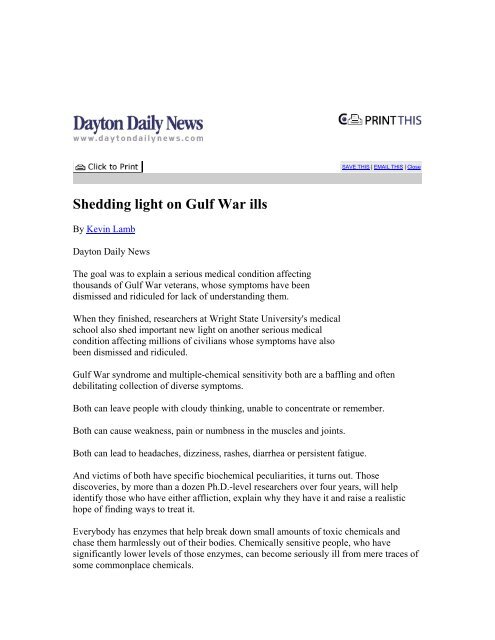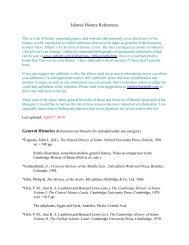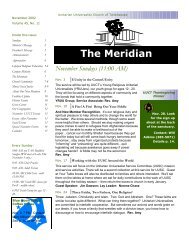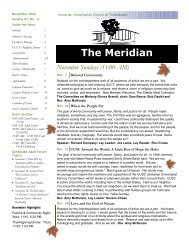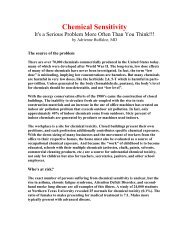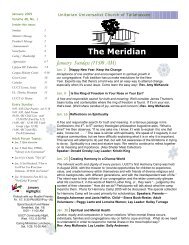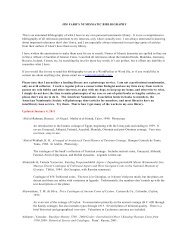Shedding light on Gulf War ills, By Kevin Lamb, Dayton Daily News
Shedding light on Gulf War ills, By Kevin Lamb, Dayton Daily News
Shedding light on Gulf War ills, By Kevin Lamb, Dayton Daily News
You also want an ePaper? Increase the reach of your titles
YUMPU automatically turns print PDFs into web optimized ePapers that Google loves.
SAVE THIS | EMAIL THIS | Close<br />
<str<strong>on</strong>g>Shedding</str<strong>on</strong>g> <str<strong>on</strong>g>light</str<strong>on</strong>g> <strong>on</strong> <strong>Gulf</strong> <strong>War</strong> <strong>ills</strong><br />
<strong>By</strong> <strong>Kevin</strong> <strong>Lamb</strong><br />
Dayt<strong>on</strong> <strong>Daily</strong> <strong>News</strong><br />
The goal was to explain a serious medical c<strong>on</strong>diti<strong>on</strong> affecting<br />
thousands of <strong>Gulf</strong> <strong>War</strong> veterans, whose symptoms have been<br />
dismissed and ridiculed for lack of understanding them.<br />
When they finished, researchers at Wright State University's medical<br />
school also shed important new <str<strong>on</strong>g>light</str<strong>on</strong>g> <strong>on</strong> another serious medical<br />
c<strong>on</strong>diti<strong>on</strong> affecting milli<strong>on</strong>s of civilians whose symptoms have also<br />
been dismissed and ridiculed.<br />
<strong>Gulf</strong> <strong>War</strong> syndrome and multiple-chemical sensitivity both are a baffling and often<br />
debilitating collecti<strong>on</strong> of diverse symptoms.<br />
Both can leave people with cloudy thinking, unable to c<strong>on</strong>centrate or remember.<br />
Both can cause weakness, pain or numbness in the muscles and joints.<br />
Both can lead to headaches, dizziness, rashes, diarrhea or persistent fatigue.<br />
And victims of both have specific biochemical peculiarities, it turns out. Those<br />
discoveries, by more than a dozen Ph.D.-level researchers over four years, will help<br />
identify those who have either afflicti<strong>on</strong>, explain why they have it and raise a realistic<br />
hope of finding ways to treat it.<br />
Everybody has enzymes that help break down small amounts of toxic chemicals and<br />
chase them harmlessly out of their bodies. Chemically sensitive people, who have<br />
significantly lower levels of those enzymes, can become seriously ill from mere traces of<br />
some comm<strong>on</strong>place chemicals.
"We were able to clearly discriminate between normal and sensitive groups," said Gerald<br />
Alter, who did much of the enzyme research. Just by analyzing blood samples, colleague<br />
Steven Berberich said, he could tell a sensitive patient from some<strong>on</strong>e else.<br />
"It doesn't necessarily take high levels of chemicals," said Daniel Organisciak, who chairs<br />
the department of biochemistry and molecular biology. "Not just the levels that we<br />
already knew might cause problems, but relatively low levels that might be in the<br />
envir<strong>on</strong>ment all the time."<br />
That makes sense to Dr. Heather Morgan, who treats chemical sensitivity in her<br />
Centerville practice. Chemicals also could be causing genetic abnormalities that lead to<br />
the enzyme deficiency, she said.<br />
Follow-up research will try to tease out the roles of both inherited genes and<br />
envir<strong>on</strong>mental c<strong>on</strong>tacts, Berberich said. He hopes it will lead to a diagnostic test that<br />
could identify chemically sensitive people before their symptoms overwhelm them.<br />
"From a patient's standpoint, it's w<strong>on</strong>derful to have this validati<strong>on</strong>," said Jackie Bart<strong>on</strong> of<br />
Centerville.<br />
"It's good that people understand this is a legitimate problem, and that when I ask people<br />
not to wear perfume, I'm not doing it just to be difficult or c<strong>on</strong>trolling. I have a very<br />
uncomfortable, sometimes l<strong>on</strong>g-term reacti<strong>on</strong> to things like fragrances, paint, new<br />
carpeting, even the chemicals thrown off by fluorescent <str<strong>on</strong>g>light</str<strong>on</strong>g>s."<br />
The Department of Defense gave Wright State $7.2 milli<strong>on</strong> toward the cost of the study<br />
and the establishment of its Center for Genomics Research. With support from Rep.<br />
David Hobs<strong>on</strong>, R-Springfield, and Springfield philanthropist Mary Petticrew,<br />
Organisciak said, the researchers explored the similarities between <strong>Gulf</strong> <strong>War</strong> veterans and<br />
the broader chemically sensitive populati<strong>on</strong>, which the Nati<strong>on</strong>al Academy of Sciences<br />
has estimated at up to 15 percent of Americans.<br />
<strong>Gulf</strong> <strong>War</strong> syndrome appears to be at least partly a heightened sensitivity to low doses of<br />
sarin, a chemical weap<strong>on</strong> known to damage the brain and nervous system in higher<br />
amounts. While it's impossible to trace directly to the estimated 80,000 veterans with<br />
symptoms, evidence indicates microscopic sarin exposure could be at least <strong>on</strong>e of the<br />
causes.<br />
"We can't be so cavalier in terms of low-dose exposure," said Mariana Morris, who chairs<br />
the pharmacology and toxicology department. Although the damage from small amounts<br />
isn't easily measured, "that doesn't mean you're not having an effect."<br />
Alter's group specifically tested organo-phosphates and formaldehyde. They both<br />
"pervade modern homes and workplaces," he said, the former in insecticides and the<br />
latter in a vast array of synthetic products that include Perma-Press clothing, c<strong>on</strong>structi<strong>on</strong><br />
pressboard and carpeting.
"We live in a toxic soup, let's face it," Morgan said.<br />
"We've been eating pesticides and herbicides laced into our foods, albeit in very low<br />
c<strong>on</strong>centrati<strong>on</strong>s, since the late 1940s. It's a huge chemical experiment that needs to be<br />
looked at, as to why we're seeing so much more chemical sensitivity over the last 25<br />
years."<br />
C<strong>on</strong>tact <strong>Kevin</strong> <strong>Lamb</strong> at 225-2129<br />
Find this article at:<br />
http://www.dayt<strong>on</strong>dailynews.com/localnews/c<strong>on</strong>tent/localnews/daily/1005gulfwar.html<br />
SAVE THIS | EMAIL THIS | Close<br />
Check the box to include the list of links referenced in the article.


